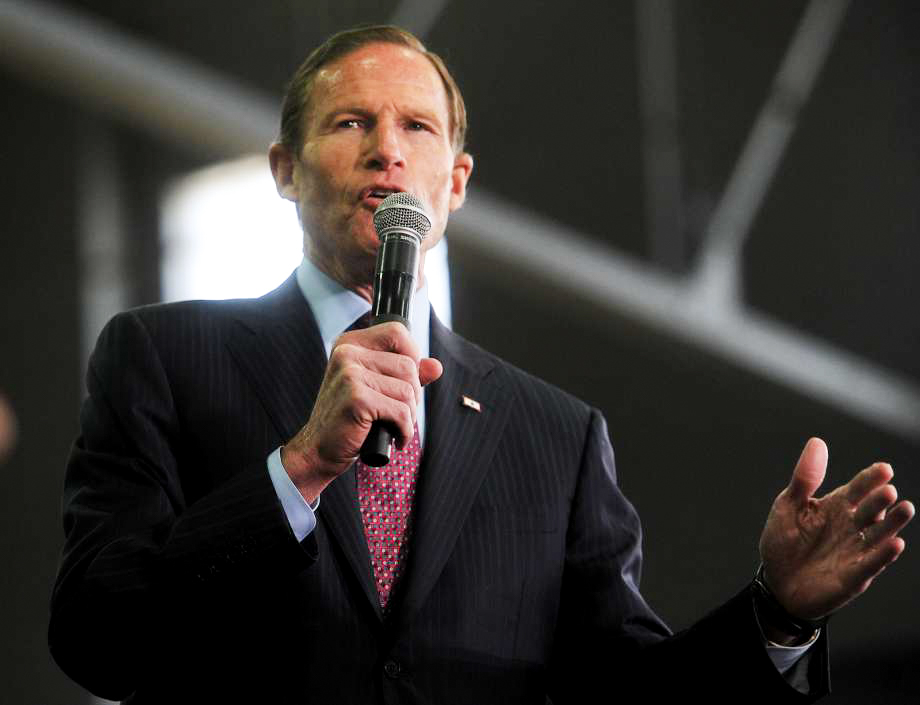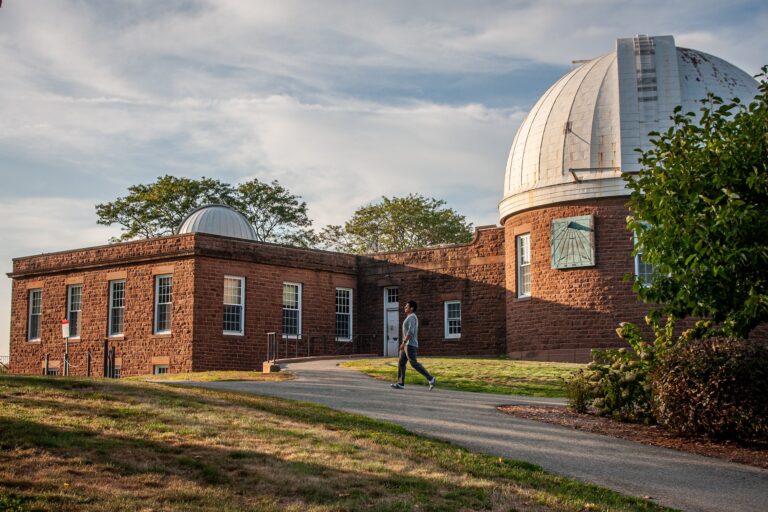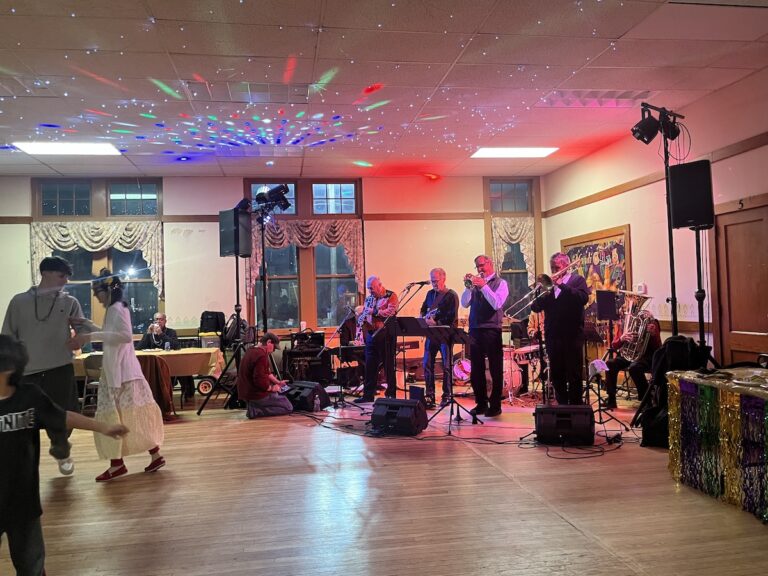Blumenthal Town Hall Addresses Policy, Partisanship
In a time of massive proposed budget cuts, controversial Supreme Court nominations, and threats to the survival of the planet, one aspect of American political culture remains bright: citizen participation in the political process. Large-scale grassroots activism and high levels of attendance at community events keep the public reaction to the Trump administration and 115th Congress in the spotlight, demanding that the president and their representatives remain accountable to their constituencies.

To that end, hundreds of Connecticut citizens—including a strong showing from students and faculty—attended US Senator Richard Blumenthal’s town hall meeting at the University’s Goldsmith Family Cinema Saturday, April 5. Residents braved the blustery weather and early start time to voice their concerns directly to the Senator.
The meeting, like that of Junior Senator Chris Murphy, was called primarily to discuss environmental concerns, which have only increased in salience as the Trump administration have rolled back Obama-era environmental protections and have continued to actively deny the existence of anthropogenic environmental degradation and climate change.
Middletown mayor and likely gubernatorial candidate Dan Drew introduced Blumenthal, calling attention to the abnormal political climate in which the country has found itself as well as the activist spirit that has arisen and sustained itself in the months following the election and inauguration.
“We’re living in very strange times,” Drew said. “We’re living through things we never thought we’d see…So the question for us now, is whether we take this moment and recognize it for what it is, and we fight it, or whether we capitulate. And if the evidence is in the activism that’s alive in this country and in this state and in this community is any indication of what’s happening on a wider level, then I think the answer is very clear that we are going to fight what’s happening in this country right now.”
In his opening remarks, Blumenthal echoed Drew’s sentiments. He praised the grassroots efforts of Connecticut’s citizens, both in their opposition to the now-defunct American Healthcare Act and in future endeavors where environmental policy and comprehensive immigration reform hang in the balance against the climate change-denying and xenophobic agenda set by the White House.
“That kind of outpouring of energy will help us now, turning to environmental causes, to defeat the crippling of the EPA, the [executive] order which permits drilling on federal land and coal mining,” Blumenthal said. “This kind of anti-environmental [policy] is contrary to what the American people want. That’s why you’re being here today, [at] this kind of event, is so immensely important. It’s the same spirit that’s going to help us achieve comprehensive immigration reform, instead of the Muslim ban…which, again, is a betrayal of American values.”
He then turned his attention to the rule of law and government accountability. According to the Senator, the two heroes of this administration will be the free press and an independent judiciary. As such, he reaffirmed his opposition to Supreme Court nominee Neil Gorsuch for allegedly passing Trump’s conservative “litmus test” and failing to state his support monumental rulings such as Roe v. Wade and Obergefell v. Hodges.
“We will oppose him,” Blumenthal said. “I will use every tool available, including beginning this week, on Monday [April 3], the filibuster. And just so we’re all clear…he could be more dangerous than the next one.”
Blumenthal quickly turned the microphone to the audience, who sought the Senator’s opinion or advice on a number of issues ranging from environmental justice to reproductive rights to healthcare and many areas in between.
Members of various Connecticut-based activist groups appeared before Blumenthal to express their opposition to the administration’s current policies as well as ask for clarification on the Senator’s positions and confirmations of support in tackling these issues. One citizen expressed particular concern over the United States’ continued commitment to the Paris Climate Agreement, asking how to best convey that environmentalism is not a political stance, but a necessity to provide security around the globe.
“Climate change affects not only our quality of life and survival as a planet; it also affects our national security,” Blumenthal said. “I sit on the armed services committee. We have devoted hearings…to hear from our military leaders about how climate change is creating risk of famine, political instability, obstacles to our use of ports for our Navy, and other kinds of peril.”
Blumenthal stressed the importance of supporting grassroots groups that devote time and energy to community education on environmental issues in addition to supporting larger environmental organizations. Addressing the nonpartisan nature of climate change, he referenced Richard Nixon, the Republican president who approved the foundation of the Environmental Protection Agency (EPA).
“I may sound naïve, but I think this is a thing that can bring us together,” he said. “And not so long ago, it did; it used to be very bipartisan. You know who created the EPA? Richard Nixon…. But I think we can go back to a time when people came together and realized that economic progress is not incompatible with environmental preservation.”
Research scientist at Yale University and founder of Action Together Connecticut Valerie Horsely addressed the effects that cuts to the NIH budget will have on labs all over the country.
Blumenthal responded by personally promising to visit the lab in New Haven, citing the importance of bringing personal stories back with him to Washington.
“I would like to come visit your lab, and what I’m trying to do is take the individual stories [back],” he said. “When we talk about numbers, it’s very hard for people to wrap their heads around numbers. To know what it means to real people, and real lives….I think the most effective way to defeat these budget cuts is to take these real stories.”
Those who disagreed with Blumenthal’s stances took the time to question the Senator, who stressed the importance of finding some area of common ground with his constituents despite party affiliation.
Dominic Rapini of Branford brought up the murder of a young woman in Bridgeport by a man who had entered the country illegally after having been deported, juxtaposing the grisly crime with the fact that Governor Dannel Malloy has declared Connecticut a sanctuary state. This high-profile crime was touted by the Trump administration to garner support for its immigration policies.
Blumenthal worked to establish what the two had in common in terms of comprehensive immigration reform: that undocumented immigrants and their families cannot continue to live in a state of fear, and that the United States should act in accordance with its laws in deporting undocumented immigrants convicted of major crimes.
“So I’ve introduced legislation that would say to the DHS [(Department of Homeland Security)], ‘You can’t go into churches and arrest people,’” Blumenthal said. “You can’t go into courthouses and arrest people. So when they come forward to file reports of domestic abuse, you can’t arrest people for coming forward. You can’t go into schools, because children now are afraid to go to schools, they’re afraid their parents will be arrested when they try to pick them up. This kind of fear is growing in the country and we need to end it.”
Blumenthal clarified his stance so as not to insinuate, as Rapini had, that being undocumented was a crime that, in and of itself, warrants deportation upon conviction. He also took a moment to denounce Trump’s travel ban as a Muslim ban. Instead, the senator remains focused more on ensuring that all current policies are recognized in the United States and abroad, maintaining that Trump’s rhetoric supporting the deportation of the approximately 11 million undocumented immigrants in this state is both unfeasible and irresponsible.
“If they are here illegally, and they have committed this kind of serious crime, they ought to be prosecuted here and if they are convicted and they’re here illegally, the law requires right now that they be deported,” Blumenthal said. “They shouldn’t be arrested simply because they are undocumented.”
Adding to the group of dissenting voices in the room, anti-abortion activists joined the meeting to express their opposition to Roe v. Wade. While affirming his respect for the speakers to have their own personal beliefs and for expressing them in a largely liberal climate, Blumenthal could not agree.
“I really believe that the Supreme Court should be above politics. It should interpret the Constitution,” he said. “….We can disagree about the law. When I went to Court [as Connecticut District Attorney] it was because there was a disagreement about the law. And I happen to believe that the right to privacy, after Griswold [v. Connecticut], after Roe [v. Wade], after Planned Parenthood v. Casey, and the most recent decision, Whole Women’s Health v. Hellerstedt, is very clearly established.
In response to one constituent’s question relating to paid family leave and quality-of-life concerns, Blumenthal commented on the commercial and financial interests that impede United States institutions from being truly representative.
“Ultimately, you’re right, [paid family leave is] about quality of life and making our work force more productive, and I’m an employer…and the happier people are when they work, the more productive they are…. And that’s why our most enlightened employers really believe in [paid family leave]. That’s why I think if Donald Trump really listens to the business community, that he will at least allow it to happen. Now, our democracy is in a bad state, because it is unrepresentative, it is too swayed by special interests, by people who make huge contributions to campaigns and have ideological motives. Neil Gorsuch was on a list posed by the Heritage foundation. The influence of money on politics, the corruption of our democracy, is one of the main challenges of our democracy today.”
He condemned Citizens United as one of the worst Supreme Court decisions in history, and said that it impedes progress on environmental causes, healthcare, and immigration, all of which can be accomplished with the implementation of meaningful campaign finance reform.
A law student asked about the ability of the Senate Intelligence Committee to properly investigate the Trump campaign’s connections to Russia, to which Blumenthal insisted that the best way forward is to appoint a special prosecutor to run the investigation and produce public reports. Senate Intelligence reports are generally classified and do not have the power to confer criminal charges on those implicated in an investigation, but a special prosecutor can release public deports and, as a member of the Justice Department, try individuals for criminal offenses.
“Part of our constitutional crisis is that we have an investigation of the president, at least of his associates and his campaign….The House Intelligence Committee is dysfunctional. It is totally tainted….We need an independent commission that will have public proceedings, produce findings, make public recommendations, and will produce a public report. Even then, here’s what is absolutely vital. Neither the intelligence committee nor the intelligence committees nor any other body can prosecute criminals, and there have been allegations of criminal wrongdoing here, so there needs to be an independent, special prosecutor.”
Many attended the meeting to ask Blumenthal to consider points of view that differ from his own and those of the Democratic Party. To conclude the town hall, a constituent asked what the office was doing for those in the sizable political minority, the approximately 40 percent that did not vote the Senator into office. Blumenthal’s response focused on civil discourse and his offices nonpartisan roles in assisting constituents through a wide array of bureaucratic, often burdensome, processes.
“The most important thing I do, that gives me the most satisfaction, is helping people individually,” Blumenthal said. “….A lot of those folks in the 40 percent are those who call my office saying, ‘Hey I need some help getting social security.’ I have made one of my missions to do more for our veterans, I have two sons who served. One of them is on active duty in the Navy and another was in the Marine Corps Reserves…he went to Afghanistan, he served there. Veterans are a cause that I champion, and it is nonpartisan, bipartisan, I was the ranking member of the Veterans Affairs Committee…I try to reach across the aisle. My goal is to try to emphasize with what we have in common. Let’s begin with where we agree, let’s try to build on it.”








Leave a Reply